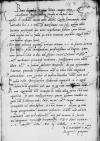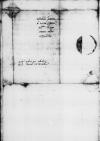1529-10-05⌊Quinta huius mensis1529-10-05⌋ allatae sunt nobis cf. Ioannes DANTISCUS to Bona Sforza Barcelona, 1529-07-26, CIDTC IDL 7010, letter lost⌊litteraecf. Ioannes DANTISCUS to Bona Sforza Barcelona, 1529-07-26, CIDTC IDL 7010, letter lost⌋
S(inceritatis) or S(trenuitatis)⌈S(inceritatis)S(inceritatis) or S(trenuitatis)⌉
Tuae datae ex Barcelona (Barcinona, Barcino), city in northeastern Spain, Catalonia⌊BarchinoneBarcelona (Barcinona, Barcino), city in northeastern Spain, Catalonia⌋ 1529-07-26⌊26 Iulii1529-07-26⌋, quibus nobis laconice perstrinxit, quae scire cupiebamus habens spem bonam omnia negotia nostra in Italy (Italia)⌊ItaliaItaly (Italia)⌋ ex animi sententia expedire. Quod utinam iam tandem assequi liceat.
Et quia omnium negotiorum nostrorum seriem S(inceritati) or S(trenuitati)⌈S(inceritati)S(inceritati) or S(trenuitati)⌉ Tuae et Jan Lewicki (†1555), before 1522 sollicitator for Primate Jan Łaski's affairs in Rome, 1522 Latin secretary to Queen Bona Sforza; ca. 1524 Cantor in Płock; 1535 superintendent of Płock cathedral; 1535 presented to the parish in Biała and to the canonry of St. Michael's collegiate church in Płock; 1538 Commendatory Abbot of the monastery of Canons Regular of the Lateran in Czerwińsk; Queen's envoy to Charles V of Habsburg (POCIECHA 2, p. 96-97)⌊Ioanni LevicioJan Lewicki (†1555), before 1522 sollicitator for Primate Jan Łaski's affairs in Rome, 1522 Latin secretary to Queen Bona Sforza; ca. 1524 Cantor in Płock; 1535 superintendent of Płock cathedral; 1535 presented to the parish in Biała and to the canonry of St. Michael's collegiate church in Płock; 1538 Commendatory Abbot of the monastery of Canons Regular of the Lateran in Czerwińsk; Queen's envoy to Charles V of Habsburg (POCIECHA 2, p. 96-97)⌋ per Tuae S(inceritatis) or S(trenuitatis)⌈S(inceritatis)S(inceritatis) or S(trenuitatis)⌉ fratrem Bernhard von Höfen (Bernhard Flachsbinder) (†after 1548), Ioannes Dantiscus' brother, stayed with Dantiscus in Spain, as a member of his mission's retinue, and was used as a trusted courier to Poland at least from 1526; after 1530 Starost of Löbau⌊BernhardumBernhard von Höfen (Bernhard Flachsbinder) (†after 1548), Ioannes Dantiscus' brother, stayed with Dantiscus in Spain, as a member of his mission's retinue, and was used as a trusted courier to Poland at least from 1526; after 1530 Starost of Löbau⌋ perscripsimus ad longum. Bernhard von Höfen (Bernhard Flachsbinder) (†after 1548), Ioannes Dantiscus' brother, stayed with Dantiscus in Spain, as a member of his mission's retinue, and was used as a trusted courier to Poland at least from 1526; after 1530 Starost of Löbau⌊QuemBernhard von Höfen (Bernhard Flachsbinder) (†after 1548), Ioannes Dantiscus' brother, stayed with Dantiscus in Spain, as a member of his mission's retinue, and was used as a trusted courier to Poland at least from 1526; after 1530 Starost of Löbau⌋ iam procul dubio et diu ad curiam sacrae Charles V of Habsburg (*1500 – †1558), ruler of the Burgundian territories (1506-1555), King of Spain as Charles I (1516-1556), King of Naples and Sicily, King of the Romans (1519-1530), Holy Roman Emperor of the German Nation (elected 1519, crowned 1530, abdicated 1556); son of Philip I the Handsome and Joanna the Mad of Castile⌊caesareae et catholicae maiestatisCharles V of Habsburg (*1500 – †1558), ruler of the Burgundian territories (1506-1555), King of Spain as Charles I (1516-1556), King of Naples and Sicily, King of the Romans (1519-1530), Holy Roman Emperor of the German Nation (elected 1519, crowned 1530, abdicated 1556); son of Philip I the Handsome and Joanna the Mad of Castile⌋ incolumem pervenisse credimus. Intelleximus enim sacram Charles V of Habsburg (*1500 – †1558), ruler of the Burgundian territories (1506-1555), King of Spain as Charles I (1516-1556), King of Naples and Sicily, King of the Romans (1519-1530), Holy Roman Emperor of the German Nation (elected 1519, crowned 1530, abdicated 1556); son of Philip I the Handsome and Joanna the Mad of Castile⌊illius maiestatemCharles V of Habsburg (*1500 – †1558), ruler of the Burgundian territories (1506-1555), King of Spain as Charles I (1516-1556), King of Naples and Sicily, King of the Romans (1519-1530), Holy Roman Emperor of the German Nation (elected 1519, crowned 1530, abdicated 1556); son of Philip I the Handsome and Joanna the Mad of Castile⌋ in Italy (Italia)⌊ItaliamItaly (Italia)⌋ feliciter traiecisse, de quo vehementer laetamur. Proinde impraesentiarum nihil in rebus nostris duximus iterandum. Nam ex litteris et informationibus nostris, quas secum a paper damaged⌈[a]a paper damaged⌉ nobis tulit Bernhard von Höfen (Bernhard Flachsbinder) (†after 1548), Ioannes Dantiscus' brother, stayed with Dantiscus in Spain, as a member of his mission's retinue, and was used as a trusted courier to Poland at least from 1526; after 1530 Starost of Löbau⌊BernhardusBernhard von Höfen (Bernhard Flachsbinder) (†after 1548), Ioannes Dantiscus' brother, stayed with Dantiscus in Spain, as a member of his mission's retinue, and was used as a trusted courier to Poland at least from 1526; after 1530 Starost of Löbau⌋, abunde cognoscet S(inceritas) or S(trenuitas)⌈S(inceritas)S(inceritas) or S(trenuitas)⌉ Tua, quid de paper damaged⌈[de]de paper damaged⌉ rebus nostris agendum sit. Quae ut ex voto transigantur, curabit paper damaged⌈[bit]bit paper damaged⌉ S(inceritas) or S(trenuitas)⌈S(inceritas)S(inceritas) or S(trenuitas)⌉ Tua.
Quomodo autem successerit nobis, absque mora litteris suis significet, ut cum intellexerimus, quem exitum tandem negotia nostra habitura sint, litteris sacrae Sigismund I Jagiellon (Zygmunt I) (*1467 – †1548), King of Poland and Grand Duke of Lithuania (1506-1548); Duke of Głogów (Glogau) (1499-1506), Duke of Opava (1501-1506), Governor of Silesia (1504-1506); son of King Kazimierz IV Jagiellon and Elisabeth of Austria⌊maiestatis regiaeSigismund I Jagiellon (Zygmunt I) (*1467 – †1548), King of Poland and Grand Duke of Lithuania (1506-1548); Duke of Głogów (Glogau) (1499-1506), Duke of Opava (1501-1506), Governor of Silesia (1504-1506); son of King Kazimierz IV Jagiellon and Elisabeth of Austria⌋, domini et consortis nostri colendissimi, et nostris Tuam
S(inceritatem) or S(trenuitatem)⌈S(inceritatem)S(inceritatem) or S(trenuitatem)⌉
ad nos ex tam longa peregrinatione revocare possemus, litteras autem ad nos transmittat aut via The Welsers merchant and banking family from Augsburg with close ties to Emperor Charles V⌊VelserorumThe Welsers merchant and banking family from Augsburg with close ties to Emperor Charles V⌋, aut per manus Gian Giacomo de Dugnano ⌊Ioannis Iacobi de DugnanoGian Giacomo de Dugnano ⌋ Venice (Venezia, Venetiae), city in northeastern Italy, capital of the Republic of Venice⌊Venetiis written over ae⌈aeisis written over ae⌉Venice (Venezia, Venetiae), city in northeastern Italy, capital of the Republic of Venice⌋ immorantis.
Et bene valeat S(inceritas) or S(trenuitas)⌈S(inceritas)S(inceritas) or S(trenuitas)⌉ Tua


 BCz, 3465, p. 62
BCz, 3465, p. 62